
|
Astronomy Picture Of the Day (APOD)
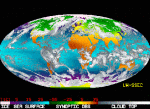 Earth's Temperature
Earth's Temperature
29.01.1997
What's the temperature outside? No matter where you are on Earth, the above map can tell you. This global montage was created using the temperature data from numerous satellites orbiting the Earth. This...
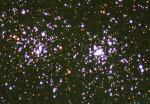 NGC 869 & NGC 884: A Double Open Cluster
NGC 869 & NGC 884: A Double Open Cluster
28.01.1997
Most star clusters are singularly impressive. But open clusters NGC 869 and NGC 884 are doubly impressive. Also known as "h and chi Persei", this rare double cluster, shown above, is bright enough to be seen from a dark location without even binoculars.
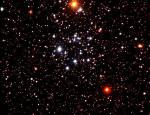 Open Cluster M50
Open Cluster M50
27.01.1997
Many stars form in clusters. Two types of star clusters are visible in our Milky Way Galaxy: open clusters and globular clusters. Open clusters like M50, shown above, typically contain hundreds of stars, many of which are bright, young, and blue.
 A Prominent Solar Prominence
A Prominent Solar Prominence
26.01.1997
One of the most spectacular solar sights is a prominence. A solar prominence is a cloud of solar gas held above the Sun's surface by the Sun's magnetic field. The Earth would easily fit under one of the loops of the prominence shown in the above picture.
 Aurora and Orion
Aurora and Orion
25.01.1997
Looking toward the south from low Earth orbit, the crew of the Space Shuttle Endeavor made this stunning time exposure of the Aurora Australis or southern lights in April of 1994. Aurora are visible at high northern latitudes as well, with the northern lights known as Aurora Borealis.
 M51: The Whirlpool Galaxy
M51: The Whirlpool Galaxy
24.01.1997
The Whirlpool Galaxy is a classic spiral galaxy. At only 15 million light years distant, M51, also cataloged as NGC 5194, is one of the brighter and more picturesque galaxies on the sky.
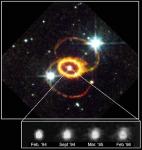 Supernova 1987a Fireball Resolved
Supernova 1987a Fireball Resolved
23.01.1997
Ten years ago the most notable supernova of modern times was observed. In February 1987, light reached Earth from a star which exploded in the nearby Large Magellanic Cloud galaxy. Supernova 1987a remains the closest supernova since the invention of the telescope.
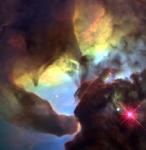 Twistin' by the Lagoon
Twistin' by the Lagoon
22.01.1997
The awesome spectacle of starbirth produces extreme stellar winds and intense energetic starlight -- bombarding dusty molecular clouds inside the Lagoon Nebula (M8). At least two long funnel shaped clouds, each roughly half a light-year long, have apparently been formed by this activity.
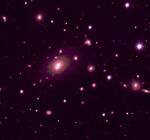 Galaxy Cluster A2199
Galaxy Cluster A2199
21.01.1997
It's bigger than a bread box. In fact, it's much bigger than all bread boxes put together. Abell 2199 is huge. In fact, it is a close, large cluster of galaxies, containing several thousands of galaxies centered around a central dominant galaxy.
 Journey to the Center of the Galaxy
Journey to the Center of the Galaxy
20.01.1997
In Jules Verne's science fiction classic A Journey to the Center of the Earth, Professor Hardwigg and his fellow explorers encounter many strange and exciting wonders. What wonders lie at the center of our Galaxy?
|
January February March April May June July August September October November December |
|||||||||||||||||||||||||||||||||||||||||||||||||